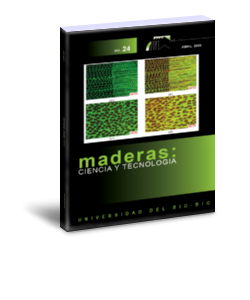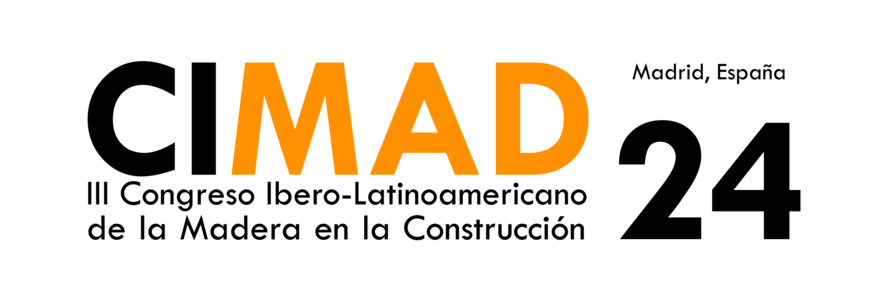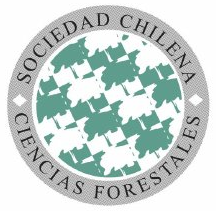Comparison of thermal performances of plywood shear walls produced with different thermal insulation materials
DOI:
https://doi.org/10.4067/s0718-221x2022000100446Keywords:
plywood, shear wall, thermal conductivity, thermal insulation materialsAbstract
Shear walls are one of the envelopes of light-frame wooden buildings where thermal insulation is most required. The thermal performance of shear walls can vary according to the type, properties and thickness of the wood and insulation materials used in their production. In this study, it was aimed to compare the thermal performances of plywood shear walls produced with different thermal insulation materials. For this aim, the archetype walls with properties similar to commonly used plywood shear walls were designed and produced for each thermal insulation material type and wood specie. The shear wall groups were formed by using Scots pine (Pinus sylvestris), black pine (Pinus nigra) and spruce (Picea orientalis) as wood species and cellulose, flax, felt, XPS, EPS, sheep’s, rock and glass wool as thermal insulation materials. Thermal conductivity of the shear wall groups was determined according to the ASTM C518-04 standard. Thermal resistance and other thermal performance parameters were calculated using the thermal conductivity values. As a result of the study, rock wool was the best thermal insulation material among the Scots pine shear wall groups while glass wool was the best thermal insulation material among the black pine and spruce shear wall groups. The shear walls produced with EPS foam boards indicated the worst thermal performance among all groups
Downloads
References
Anh, D.H.; Pásztory, Z. 2021. An overview of factors influencing thermal conductivity of building insulation materials. J Build Eng 44: 102604. https://doi.org/10.1016/j.jobe.2021.102604
Asdrubali, F.; D'Alessandro, F.; Schiavoni, S. 2015. A review of unconventional sustainable building insulation materials. SM&T 4: 1-17. http://dx.doi.org/10.1016/j.susmat.2015.05.002
Asdrubali, F.; Pisello, A.L.; D'Alessandro, F.; Bianchi, F.; Fabiani, C.; Cornicchia, M.; Rotili, A. 2016. Experimental and numerical characterization of innovative cardboard based panels: Thermal and acoustic performance analysis and life cycle assessment. Build Environ 95: 145-159. http://dx.doi.org/10.1016/j.buildenv.2015.09.003
American Society for Testing and Materials. 2004. ASTM C518 - 04: Standard Test Method for Steady-State Thermal Transmission Properties by Means of the Heat Flow Meter Apparatus. West Conshohocken, A, United States.
https://www.astm.org/DATABASE.CART/HISTORICAL/C518-04.htm
American Society for Testing and Materials. 2014. ASTM E72 - 13a: Standard test methods of conducting strength tests of panels for building construction. West Conshohocken, A, United States.
https://www.astm.org/DATABASE.CART/HISTORICAL/E72-13A.htm
Balaras, C.A.; Droutsa, K.; Argiriou, A.A.; Asimakopoulos, D.N. 2000. Potential for energy conservation in apartment buildings. Energy Build 31(2): 143-154. https://doi.org/10.1016/S0378-7788(99)00028-6
Berge, A.; Johansson, P.Ä.R. 2012. Literature review of high performance thermal insulation. Report in Building Physics. Department of Civil and Environmental Engineering Division of Building Technology, Chalmers University of Technology, Gothenburg, Sweden. https://research.chalmers.se/en/publication/159807
Bisch, P.; Carvalho, E.; Degee, H.; Fajfar, P.; Fardis, M.; Franchin, P.; Kreslin, M.; Pecker, A.; Pinto, P.; Plumier, A.; Somja, H.; Tsionis, G., 2012. Eurocode 8: Seismic design of buildings-Worked examples. JRC Scientific & Technical Reports, European Commission Joint Research Center, Ispra, Italy. https://doi.org/10.2788/91658
Cetiner, I.; Shea, A.D. 2018. Wood waste as an alternative thermal insulation for buildings. Energy Build 168: 374-384. https://doi.org/10.1016/j.enbuild.2018.03.019
Çomaklı, K.; Yüksel, B. 2003. Optimum insulation thickness of external walls for energy saving. Appl Therm Eng 23(4): 473-479. https://doi.org/10.1016/S1359-4311(02)00209-0
Domínguez-Muñoz, F.; Anderson, B.; Cejudo-López, J.M.; Carrillo-Andrés, A. 2010. Uncertainty in the thermal conductivity of insulation materials. Energy Build 42(11): 2159-2168. https://doi.org/10.1016/j.enbuild.2010.07.006
Ducoulombier, L.; Lafhaj, Z. 2017. Comparative study of hygrothermal properties of five thermal insulation materials. Case Stud Therm Eng 10: 628-640. https://doi.org/10.1016/j.csite.2017.11.005
Duijve, M. J. 2012. Comparative assessment of insulating materials on technical, environmental and health aspects for application in building renovation to the Passive house level. Master Thesis. Energy Science of Utrecht University, Utrecht, Netherland.
https://www.scribd.com/document/366143838/Melchert-Duijve-MSc-Thesis-LCA-Insulation-Materials-2012
Food and Agriculture Organization of the United Nations. FAO. 2022. Thermal insulation materials, technical characteristics and selection criteria. FAO, Rome, Italy. https://www.fao.org/3/y5013e/y5013e08.htm
Florea, I.; Manea, D.L. 2019. Analysis of thermal insulation building materials based on natural fibers. Procedia Manuf 32: 230-235. https://doi.org/10.1016/j.promfg.2019.02.207
Gu, H.M.; Zink-Sharp, A. 2005. Geometric model for softwood transverse thermal conductivity. Part I. Wood Fiber Sci 37(4): 699-711. https://wfs.swst.org/index.php/wfs/article/view/435
Hassanin, A.H.; Candan, Z.; Demirkir, C.; Hamouda, T. 2018. Thermal insulation properties of hybrid textile reinforced biocomposites from food packaging waste. J Ind Text J Ind Text 47(6): 1024-1037. https://doi.org/10.1177/1528083716657820
International Energy Agency. IEA. 2020. World Energy Outlook 2020, Committee of International Energy Agency, Paris, France. https://www.iea.org/reports/world-energy-outlook-2020
International Organization for Standardization. 2003a. ISO 9427: Wood-based panels - Determination of density. Geneva, Switzerland.
https://www.iso.org/standard/32853.html
International Organization for Standardization. 2003b. ISO 16979: Wood-based panels - Determination of moisture content. Geneva, Switzerland.
https://www.iso.org/standard/32837.html
Jannat, N.; Hussien, A.; Abdullah, B.; Cotgrave, A. 2020. A comparative simulation study of the thermal performances of the building envelope wall materials in the tropics. Sustainability 12(12): 4892. http://dx.doi.org/10.3390/su12124892
Kamke, A.F.; Zylkowoski, S.C. 1989. Effects of wood-based panel characteristics on thermal conductivity. Forest Prod J 39: 19–24. https://agris.fao.org/agris-search/search.do?recordID=US8917002
Kol, H.Ş.; Altun, S. 2009. Effect of some chemicals on thermal conductivity of impregnated laminated veneer lumbers bonded with poly (vinyl acetate) and melamine–formaldehyde adhesives. Dry Technol 27(9): 1010-1016. https://doi.org/10.1080/07373930902905092
Kosny, J.; Asiz, A.; Smith, I.; Shrestha, S.; Fallahi, A. 2014. A review of high R-value wood framed and composite wood wall technologies using advanced insulation techniques. Energy Build 72: 441-456. http://dx.doi.org/10.1016/j.enbuild.2014.01.004
Krüger, E.L.; Adriazola, M. 2010. Thermal analysis of wood-based test cells. Constr Build Mater 24(6): 999-1007. https://doi.org/10.1016/j.conbuildmat.2009.11.019
Kumar, D.; Alam, M.; Zou, P.X.; Sanjayan, J.G.; Memon, R.A. 2020. Comparative analysis of building insulation material properties and performance. Renew Sust Energ Rev 131: 110038. https://doi.org/10.1016/j.rser.2020.110038
Liu, M.; Lu, F.; Zhang, X.; Yang, X. 2020. Effects of diagonal bracing on thermal insulation of wood-frame walls. BioResources 15(1): 517-528.
Liu, M.; Sun, Y.; Sun, C.; Yang, X. 2018. Study on thermal insulation and heat transfer properties of wood frame walls. Wood Res 63(2): 249-260. http://www.woodresearch.sk/wr/201802/07.pdf
Liu, Y.; Gao, Z.; Ma, H.; Gong, M.; Wang, H. 2021. Racking Performance of Poplar Laminated Veneer Lumber Frames and Frame-shear Hybrid Walls. BioResources 16(1): 354-371. https://ojs.cnr.ncsu.edu/index.php/BioRes/article/view/BioRes_16_1_354_Liu_Racking_Performance_Poplar_Veneer/8181
Peng, C.; El Damatty, A.A.; Musa, A.; Hamada, A. 2020. Simplified numerical approach for the lateral load analysis of light-frame wood shear wall structures. Eng Struct 219: 110921. https://doi.org/10.1016/j.engstruct.2020.110921
Schiavoni, S.; D׳Alessandro, F.; Bianchi, F.; Asdrubali, F. 2016. Insulation materials for the building sector: A review and comparative analysis. Renew Sustain Energy Rev 62: 988-1011. http://dx.doi.org/10.1016/j.rser.2016.05.045
Sonderegger, W.U. 2011. Experimental and theoretical investigations on the heat and water transport in wood and wood-based materials. Ph.D. Thesis, ETH Zurich, Zurich, Switzerland. https://www.research-collection.ethz.ch/handle/20.500.11850/152766
Sonderegger, W.U.; Niemz, P. 2009. Thermal Conductivity and Water Vapour Transmission Properties of Wood Based Materials. Eur J Wood Prod 67: 313-321. http://dx.doi.org/10.1007/s00107-008-0304-y
United Nations Environment Programme. 2020. 2020 Global Status Report for Buildings and Construction: Towards a Zero-emission. Efficient and Resilient Buildings and Construction Sector. Global Alliance for Buildings and Construction, Nairobi, Kenya. https://globalabc.org/news/launched-2020-global-status-report-buildings-and-construction
Wang, J.S.; Demartino, C.; Xiao, Y.; Li, Y.Y. 2018. Thermal insulation performance of bamboo-and wood-based shear walls in light-frame buildings. Energy Build 168: 167-179. https://doi.org/10.1016/j.enbuild.2018.03.017
Zhou, X.Y.; Zheng, F.; Li, H.G.; Lu, C. L. 2010. An environment-friendly thermal insulation material from cotton stalk fibers. Energy Build 42(7): 1070-1074. http://dx.doi.org/10.1016/j.enbuild.2010.01.020
Downloads
Published
How to Cite
Issue
Section
License

This work is licensed under a Creative Commons Attribution 4.0 International License.
Los autores/as conservarán sus derechos de autor y garantizarán a la revista el derecho de primera publicación de su obra, el cuál estará simultáneamente sujeto a la Licencia de Reconocimiento de Creative Commons CC-BY que permite a terceros compartir la obra siempre que se indique su autor y su primera publicación esta revista.




































